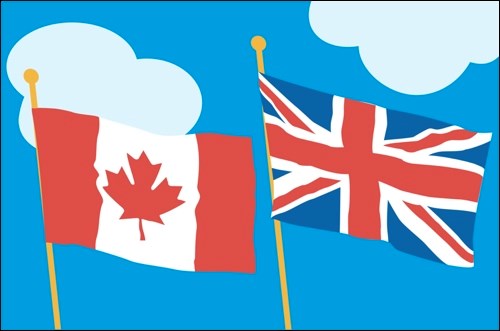Late last year in Northern England, the nephew of one my distant cousins was beaten to death with an iron rod by seven youths who could find nothing better to do. This is the kind of cruel incident that gives rise to xenophobia both here and over the water in Trumpland. People who loved the murdered youth shed bitter tears.
Shortly before the incident, workers in government offices also had cause for grief. They learned that, within a year, the positions they held would move south to London. For most of them, the choice was to remain in their familiar homes and try to find a new job or leave their familiar community and move to London. In the Brexit referendum, the north of England voted to cut ties with the European Union. By a narrow margin, they were on the winning side. Scotland and Northern Ireland chose to remain in the European Union.
When I was born there was still a British Empire. When I was four, the Statute of Westminster made Canada a self-governing Dominion. My mother’s family didn’t know the Empire was beginning to crumble nor did the Saskatchewan school system. We sang The Maple Leaf Forever, which extolled the heroism of General Wolfe, victor in the Battle of the Plains of Abraham. We also sang Land of Hope and Glory, which extolled everything British and boasted “wider still and wider may thy bounds (of empire) be set.”
At home, I read stories of the battles that built an empire – of the defeat of the Spanish Armada, of British buccaneers on the Spanish Main, of ships of the line and frigates that brought about the defeat of Napoleon Bonaparte, of the great, grey ships of the Battle of Jutland.
The British Empire entered combat in the First World War in 1914. The United State of America took up arms in 1917. When the war ended Great Britain was weakened from the loss of too much wealth and blood. America had its losses, but had grown stronger as the banker and builder for Britain and France.
Twenty years after that war ended, I was reading magazines such as Boys’ Own Paper and Chums Annual. Both presented clean-cut British youths, brave, intelligent and virtuous, whose mission was to instruct, as Kipling put it, “the lesser breeds without the law.” I didn’t realize an empire was dying.
The flaws in the Treaty of Versailles made the Second World War inevitable. The United Kingdom and Canada declared war on the Axis powers in 1939. The United States came to their aid in December of 1941. When the war ended, Britain was exhausted. The United States was stronger militarily and economically than ever before. Leadership of the English-speaking world was in Washington, D.C.
England has voted to cut ties with the European Union, but to remain as a member of NATO. People voted on the basis of their own opinions. Some who were happy with the country’s economic strength voted to stay and some who were happy with the country’s strength voted to leave, because they didn’t need the European Union. Those whose work had been made redundant by massive centralization blamed the European Union and voted to leave.
The underlying cause of the turmoil began in the Industrial Revolution, when machines began to replace craftsmen. Today, we are close to having a work force made up of robots. Where will human beings find employment and the necessities of life when all the profits of production go to the people who own the robots? The robots will be the slaves of their owners very much in the same way as black cotton pickers were the slaves of plantation owners two centuries ago.
Redundant workers are also a problem in the United States. Along with a grim menu of other problems, the unrest is amplified into violence by the system of government and a cumbersome electoral system. Why do well educated persons think poor people are responsible for their own misfortunes? Why do they think immigrants are the cause of disappearing jobs?
In 1949, the British Commonwealth became the 53-member Commonwealth of Nations. The bonds that held the former British Empire together had weakened. They are still weakening.
I watched the televised celebration of Canada Day. I saw military displays that were filled with English and Scottish traditions. I felt sad. I wonder whether Brexit is a step on the way to the breakup of the United Kingdom. I wonder whether the realm of future monarchs of the House of Windsor will become much smaller than the province of Saskatchewan.



